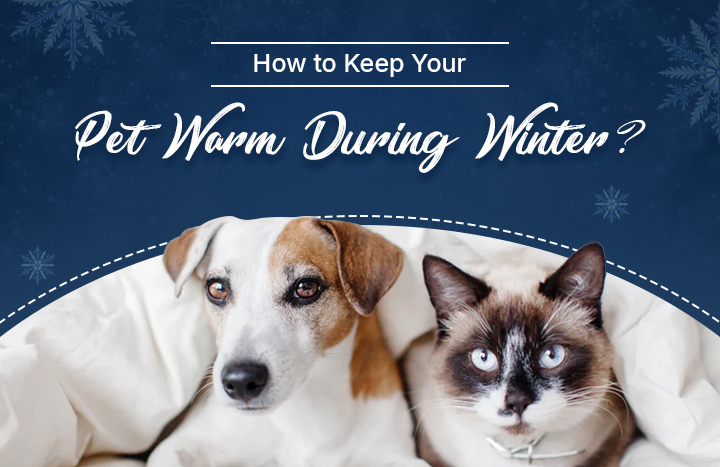
Winter can be quite harsh on our four-legged furry babies. While we can easily protect ourselves from the chilling weather by popping on a jumper or snuggling up to a fireplace, our pets need extra care to remain warm and keep themselves comfortable in the biting cold. If you are new to pet parenthood and wondering how to keep your pal cozy this winter, you’ve come to the right place. In this blog, we’re happy to share some of the most effective ways that will help you keep your pet warm and safe during the upcoming winter. Let’s get started.
Why do Pets Need Extra Care in Winter?
It is important that we provide our pets extra care in winter as the cold weather can negatively affect their health and comfort in various ways. The cold weather makes our furry companions vulnerable to conditions like hypothermia and frostbite, especially on the exposed areas of their bodies, such as ears, tails, and paws. Cold temperatures can also cause their paws to crack and dry out. Some pets, particularly those with thin fur, short legs, or certain health conditions, may experience lethargy, weakness, or more serious complications when exposed to the cold weather.
Tips to Keep Pets Warm While Indoors
Here are a few tips that will help you keep your pet warm while they are indoors.
- Create a Warm Sleeping Space
One of the best ways to keep your pet warm during winter is to provide them with a warm space to sleep. It helps regulate their body temperature and protect them from cold floors, as prolonged contact with chilly surfaces can trigger health issues such as hypothermia and arthritis. It will also prevent joint pain and other cold-related ailments, especially in senior pets or those with joint problems.
- Maintain a Comfortable Indoor Temperature
During winter, it is crucial that you regulate your indoor temperature to keep your furry babies at ease. The ideal indoor temperature for pets generally ranges between 20°C and 22°C, which keeps most dogs and cats warm without overheating. Maintaining an optimum indoor temperature during winter is particularly important for small, short-haired, elderly, or sick pets who are more vulnerable to cold.
Moreover, maintaining a stable temperature inside your home will help reduce stress for your pet.
- Offer Warm Clothing
If your pet has short or no hair, dressing it up with warm clothing is a great way to keep it protected during the harsh winter months. There is a wide range of pet-specific coats and jackets available in the market, so you can go for the apparel of your choice and your pet’s winter requirements. However, whatever piece of clothing you’re choosing, make sure that it leaves your pet enough space to breathe and doesn’t have dangling buttons that they can swallow.
Tips to Keep Pets Warm While Outdoors
Here are a few tips that will help you keep your pet warm while they are outdoors.
- Limit Outdoor Time
During extreme cold weather, it is crucial that you limit your pet’s outdoor time as prolonged exposure to cold temperatures can lead to hypothermia, frostbite and a range of other winter-related health issues. Young and senior pets, as well as those with short hair are more vulnerable to cold weather and need their outdoor time to be restricted to only bathroom breaks or short walks. Extended exposure to the cold weather can cause discomfort, shivering, lethargy and even severe health issues that may require urgent veterinary care.
- Protect their Paws from Snow
If you live in a snowfall area, you need to be particularly careful as the snow can accumulate and form clumps between your pet’s toes and fur and cause irritation, pain and difficulty walking. Prolonged exposure to snow can also cause frostbite and crack and dry out their paw pads. Therefore, it is recommended that you make use of protective booties to keep your pet’s paws shielded during winter.
- Dry Your Pet After Walks
In winter, your pet’s fur and paws can get wet during outdoor walks. Therefore, it is very important that you dry it thoroughly so as to keep it warm, as wet fur and paws can trigger the risk of hypothermia and joint pain, especially for senior pets or those suffering from arthritis. Damp fur also leads to matting and tangling that can cause skin irritation and discomfort.
Nutrition and Hydration Requirements of Pets During Winter
Pets tend to get hungrier during the colder months as they need more energy to remain warm. Also, the calorie requirement of a pet depends on its weight and coat type. Dogs and cats with thin or hairless coats and low body fat require more calories to regulate their body heat. However, pets with thick coats and higher body density require fewer calories.
Pets also require adequate hydration during winter, as despite the cold weather, they can get dehydrated due to dry indoor air. Dehydration can lead to kidney issues, urinary tract infections and digestive troubles. To keep your pet hydrated during winter, it is essential that you provide clean, drinking water consistently, monitor their water intake and incorporate moisture-rich foods like wet food or broth to their diet.
Special Tips for Vulnerable Pets During Winter
Here are some tips to help you keep your vulnerable pets warm during winter.
- Puppies, Kittens and Senior Pets
If you are a parent to a puppy, a kitten or a senior pet, you should take special care to keep them warm during winter as they are specifically vulnerable to winter-related health issues. It is important to keep them indoors as much as possible, especially in very cold or windy weather, as it is difficult for them to regulate their body temperature and they are at higher risk of hypothermia and frostbite. However, if you are taking them outdoors for a short time, you must provide them with protective clothing such as fitted coats or sweaters suited to their size and breed. Also, ensure their sleeping area is warm and dry. You may use extra blankets, heated beds, or soft bedding materials to provide them with warmth and comfort.
- Short-Haired and Small Breed Pets
If your pet is a short-haired one or belongs to a small breed, you will need to provide them with extra protection during winter as they have less natural insulation and lose body heat faster. Prolonged exposure to cold weather can lead to hypothermia, joint stiffness, and respiratory discomfort. To keep them protected, you may cover them with well-fitted, insulated, and waterproof coats or sweaters that cover their belly and chest to retain body heat.
Common Winter Health Concerns for Pets
Below are the common health concerns for pets during winter.
- Hypothermia and Frostbite
- Respiratory Infections
- Dry Skin and Allergies
- Joint Pain and Arthritis
- Weight Gain Due to Lack of Exercise
- Kidney Issues Due to Dehydration
- Skin Infection from Wet or Matted Fur
Winter Gear Checklist for Pet Parents
The following winter gear checklist will equip you for the upcoming winter.
- Pet-specific jackets, sweaters or hoodies
- Pet-specific booties or paw protectors
- Paw wax
- Insulated blankets
- Eye protection for snowy conditions
- Portable water bottles and collapsible bowls to encourage drinking during walks
Frequently Asked Questions
- What kind of clothing is recommended for pets during winter?
Insulated coats, sweaters and waterproof coats help retain warmth and protect pets from wind and snow. Booties protect pets’ paws from cold and ice.
- How can I protect my pet’s paws during winter?
To protect your pet’s paws during winter, you may use pet-specific booties or apply paw wax to prevent cracking, dryness and injuries from ice or salt. After walks, wipe its paws to remove salt or chemicals and be vigilant for cracks or signs of frostbite.
- Can I leave my pet in the car during winter?
It is not advisable that you keep your pet in the car during winter as cars can rapidly chill pets and pose serious health risks, especially for young, elderly or ill animals.
- What should I do if my pet shows signs of hypothermia or frostbite?
If your pet is shivering, being lethargic or anxious during winter, get in touch with the vet at the earliest. Frostbite may not be obvious at the beginning, so an early assessment is crucial.
Parting Words
We hope that our article will help you gear up for the upcoming cold weather and ensure that your furry companions thrive even during the chilliest days.As pet lovers, you can also remain watchful of abandoned pets during this cold season. The best thing is to get in touch with the relevant authorities if you find animals unattended and suffering outdoors in the chilly weather.

